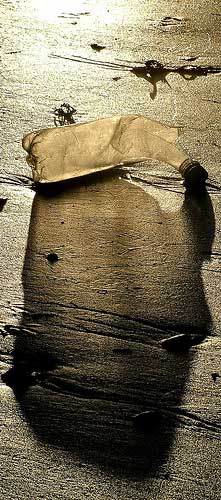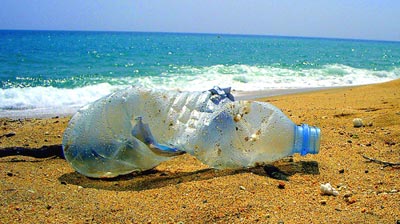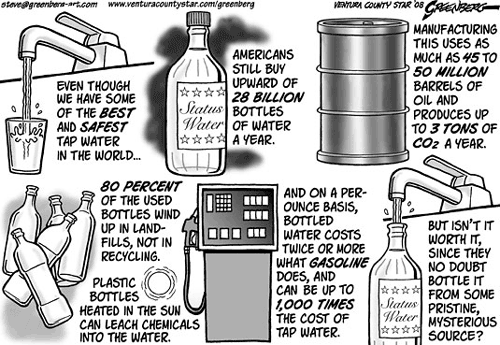GUEST ARTICLE: While clean safe drinking water is vital for human health, Australians are becoming increasingly thirsty for bottled water products writes Jeff Angel (Director of the Total Environment Centre).
A recent report by the Earth Policy Institute said global consumption of bottled water rose 57% from 1999 to 2004 to 154 billion litres, with Australians consuming 550 million litres every year. And with the current big push from beverage companies of this ‘new’ product, the market is expected to keep growing to a worth of over $460 million per year.
Bottled water is an unjustified luxury that, except for essential safety or medical reasons, is simply a fashion statement roaming free of environmental responsibility.
The life cycle of a plastic bottle goes through various stages – producing the package, water sourcing, transport of a heavy product, merchandising, sale and eventually disposal. There are many serious implications at each of these stages.
The worldwide packaging for bottled water requires 2.7 million tonnes of plastic each year, with growing concerns about the environmental costs, such as the pollution and resource depletion from the oil, gas and coal used in the production process. The raw material cost will increasingly reflect its use as a crude oil derivative.
The NSW Department of Environment and Climate Change estimates that about 200 millilitres of oil is needed to produce just one one-litre bottle – and billions of bottles are produced each year.
The bottled water industry disputes this – but then they have crafted arguments that make them look like green warriors and a great social service.
“Spring Water”
Not only does the production process have serious environmental implications, but the sourcing and extraction of the so called ‘spring water’ is endangering local groundwater supplies.
The bottled water industry is licensed to take 1,800 megalitres of water from the groundwater system in NSW every year. Note that the industry tries to play down its water impact by placing itself in the context of continental water supplies.
However, local sourcing can result in exhaustion and depletion of underground aquifers which have a flow on effect of drying out swamps and other water bodies, threatening aquatic plants and animals already under stress from the drying climate caused by global warming.
Coca-Cola Amatil is currently fighting the local community and Gosford City Council at Mangrove Mountain, north of Sydney, to triple its water extraction to 66 million litres a year.
Groundwater feeds into the area’s rivers and streams and currently the Mangrove Creek Dam is at less than 22% of capacity.
This fact and the noted lowering of the groundwater table in the area call into question the sustainability of local groundwater aquifers for bottled water extraction.
The economics are also of concern. If Coca-Cola Amatil is allowed to triple its extraction, it will be able to sell the water to retailers for around $18 million. This is far above the government’s extraction fee.
Price of Bottled Water
The average price of bottled water is $2.53 a litre against about a cent a litre for tap water.
Bottled water, often attractively described as ‘pristine’, ‘pure’, ‘clean’ and even ‘organic’ in marketing, is between 240-10,000 times more expensive than tap water – more than is paid for petrol, even though approximately 25% of bottled water has been sourced directly from municipal tapwater systems.
Over 90% of the cost of bottled water is associated with the bottle, lid and label.
Carbon Footprint
There are also significant costs in the shipping and transport of bottled water (a heavy commodity), particularly over long distances, resulting in burning massive amounts of fossil fuels.
Hundreds of thousands of tonnes of global warming pollution is produced every year by shipping bottled water from places such as Fiji. Talk about food miles!
Plastic Bottles: Landfill, Litter & Pollution
However, the most devastating cost to the environment is the disposal of used bottles. Whether dumped into landfill or dropped as litter, the increasing number of water bottles is a growing problem.
Approximately 70% of plastic drink bottles end up in landfill and take up to 1000 years to biodegrade. While not being the most numerous litter item, they do take up a lot of space compared to other types of waste, comprising 38% of the total volume of litter.
Bottles that do not get recycled or landfilled pose a serious threat, according to the founder of the Beach-combers and Oceanographers International Association.
A one-litre plastic water bottle could break down into enough small fragments to be washed up on every kilometre of beach in the world.
There are an estimated 13,000 pieces of plastic on every square kilometre of the ocean surface. These tiny pieces are easily swallowed by marine life and can have a deadly effect. More than one million seabirds and 100,000 marine mammals are killed as a result every year. And it’s not just bottles tossed overboard; any bottle dropped anywhere can eventually make its way into the ocean.
Alleged Health Benefits of Bottled Water
Despite the enormity of all these environmental costs, there exists the argument that bottled water is better for human health.
However, while access to clean drinking water is an issue in some countries, Australia is not one of them.
The Australian Drinking Water Guidelines which provide the framework for those who manage and deliver Australia’s water resources are far more stringent than the Australia New Zealand Food Standards Code that regulates bottled water.
A recent analysis of bottled water published in The Australian, found that the best selling bottled water was no cleaner than the cheapest brand and none of the bottled water tested was any better than tap water from Melbourne, Sydney and Adelaide (which is regarded as having the murkiest tap water).
In fact, an estimated 25% of bottled water is found to actually be just tap water in a bottle.
Furthermore, there has been some evidence that water stored in plastic bottles can be contaminated by chemicals leaching from the plastic cap or liner. Although there are regulatory standards limiting these chemicals (called phthalates) in tap water, there are no legal limits for phthalates in bottled water.
Tap water fluoridation is also the most effective, efficient way to combat tooth decay. Bottled water removes the benefit of fluoride and may result in increasing tooth decay, particularly among children.
We Don’t Need Bottled Water
So we don’t need bottled water in Australia. But then we consume lots of things we ‘don’t need’. To be a responsible consumer we need ask the question of each product – what is its environmental footprint from production, use and disposal; is there an environmentally preferable substitute; and do I really need it?
The biggest change you as a consumer can make is to not buy bottled water. Use home filtering systems, refillable water bottles, and drink tap water, if you want reduce the impact on landfills, and help prevent the drying out of groundwater resources, ocean litter and global warming.
This article was written by Jeff Angel (Director of the Total Environment Centre) and was originally published in the Green magazine, Autumn 2008, Issue 25. Jeff has given permission to republish the article on this website.
If you’re a blogger or an expert about a topic I cover on this blog I encourage you to contact me and I’ll consider publishing your guest article here including generous attribution and back links back to your website as thanks for your contribution
Why Bottled Water is a Scam
EDITOR: I’ve added the cartoon below because it perfectly summarises how illogical it is to buy constantly buy new bottled water instead of refilling the same bottle everyday with tap water instead.
Further Reading
- Choice Magazine Report on Bottled Water – “Buy bottled water if you like the taste, but don’t kid yourself it’s healthier than water from the tap“
- Message in a Bottle (Fast Company) – “Americans spent more money last year on bottled water than on ipods or movie tickets: $15 Billion. A journey into the economics and psychology of an unlikely business boom. And what it says about our culture of indulgence“
- Natural Resources Defense Council – Bottled Water, Pure Drink or Pure Hype? – “four-year study of the bottled water industry, including its bacterial and chemical contamination problems. The petition and report find major gaps in bottled water regulation and conclude that bottled water is not necessarily safer than tap water“
- Marketing ‘juggernaut’ creating flood of bottled water (ABC News) – “It is one of the most remarkable marketing coups of the last quarter of a century- the explosion in bottled water sales in a country where a safer, better tasting alternative is available for a fraction of the cost on tap“
- The real cost of bottled water (The Age Newspaper) – “Australia’s love affair with bottled water is costing the planet 314,000 barrels of oil a year“
- Don’t buy bottled water, activists urge (Sun Herald) – “For every tonne of one-litre bottles of Evian water shipped to Australia each year, for example, at least 84kilograms of harmful emissions are created“





Leave a Reply